小升初语法复习--形容词 副词 介词课件(56张ppt)
文档属性
| 名称 | 小升初语法复习--形容词 副词 介词课件(56张ppt) |
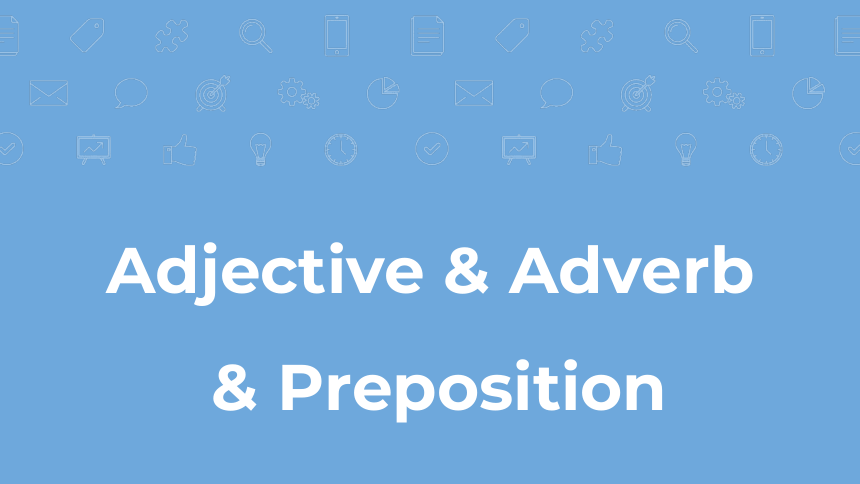
|
|
| 格式 | zip | ||
| 文件大小 | 20.7MB | ||
| 资源类型 | 教案 | ||
| 版本资源 | 通用版 | ||
| 科目 | 英语 | ||
| 更新时间 | 2020-04-30 00:00:00 | ||
图片预览


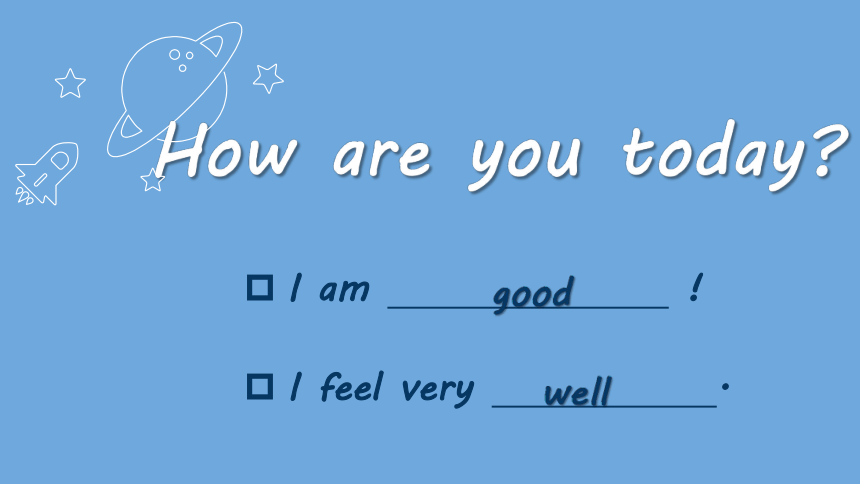
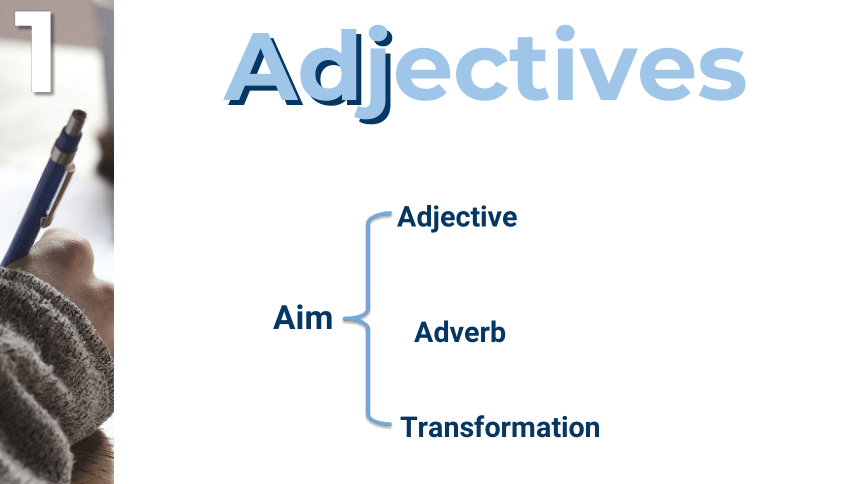
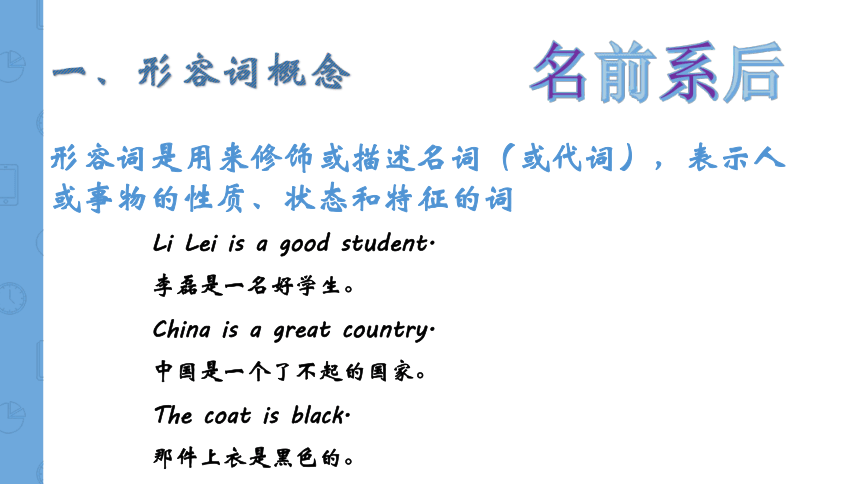
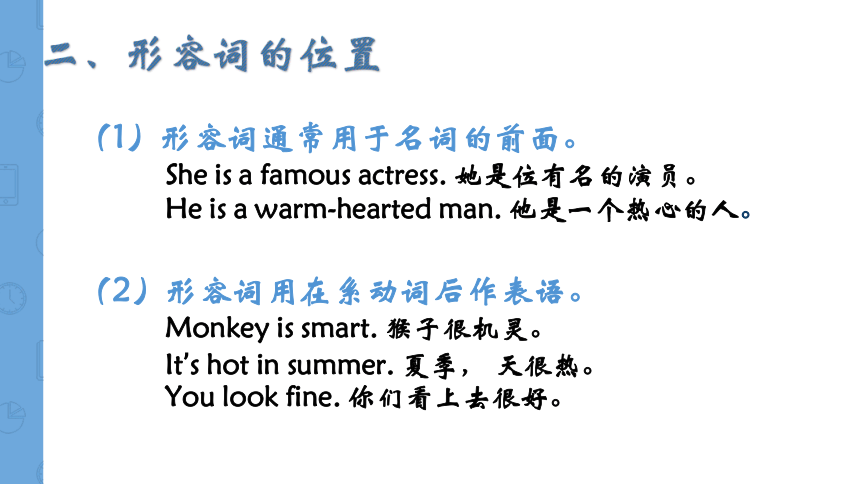
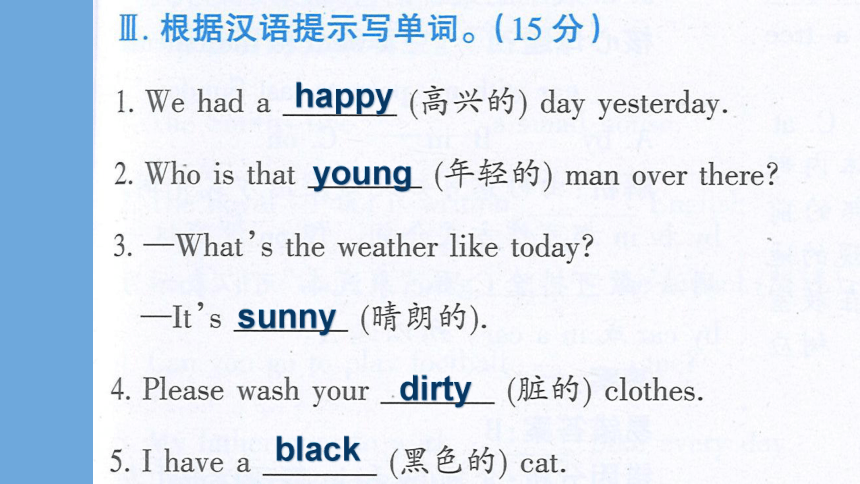
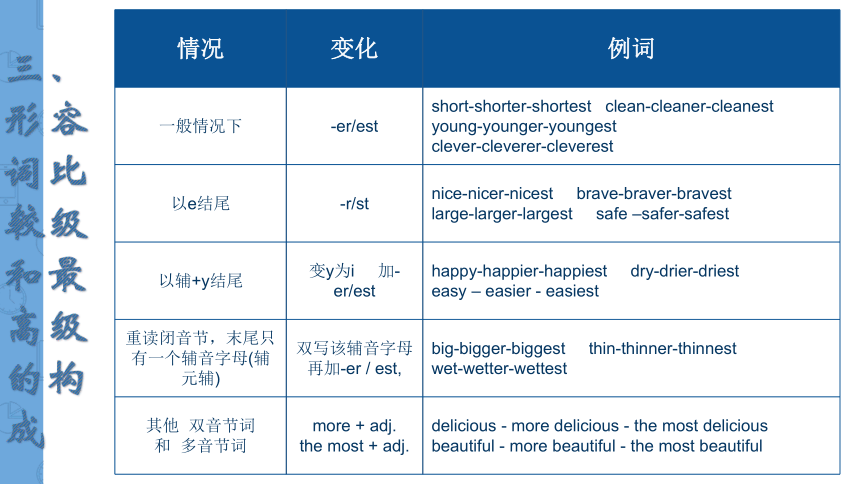
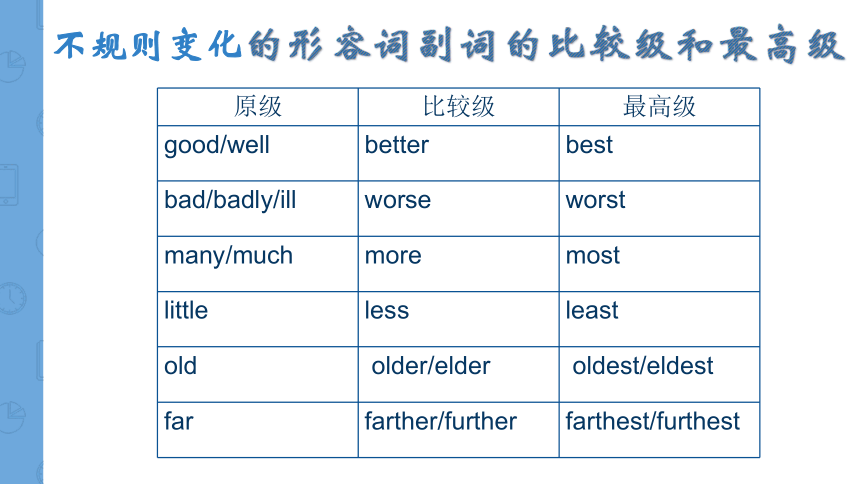
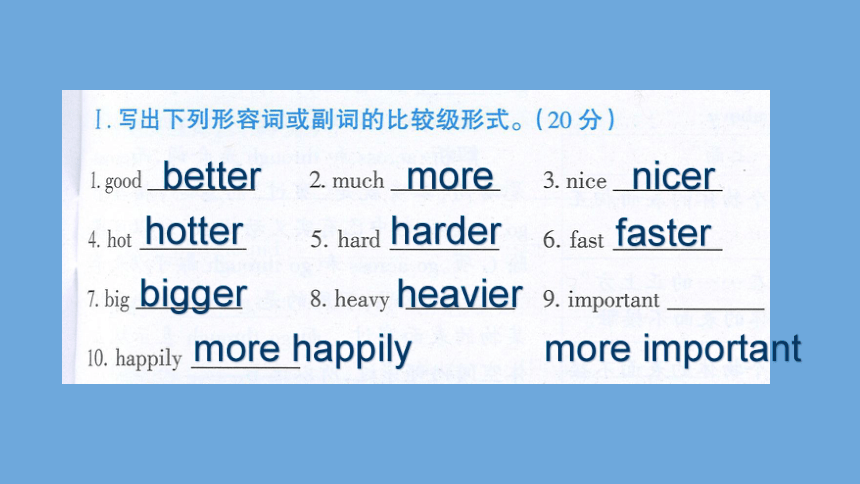
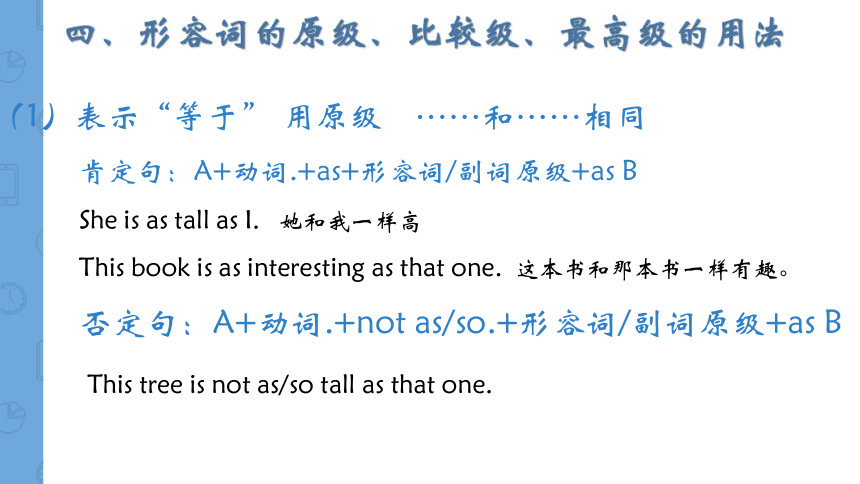
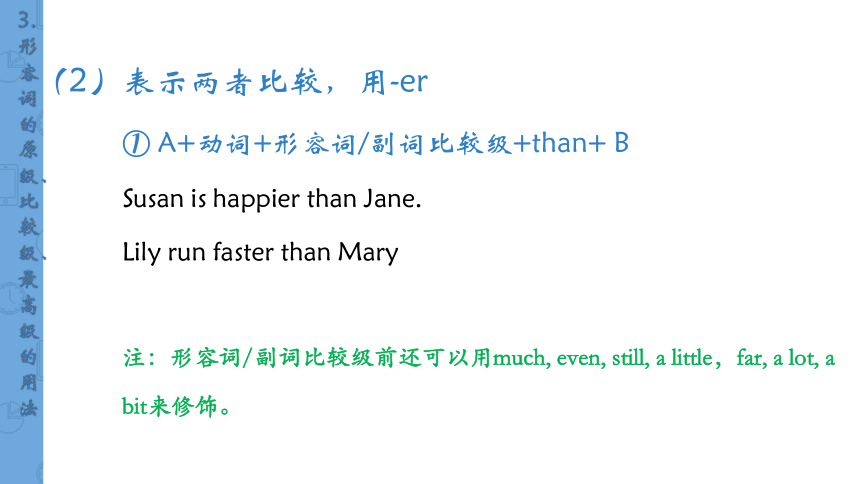
文档简介
(共56张PPT)
Adjective & Adverb
& Preposition
How are you today?
How are you today?
I am !
I feel very .
good
well
Adj
Adjectives
1
Adjective
Adverb
Aim
Transformation
一、形容词概念
形容词是用来修饰或描述名词(或代词),表示人或事物的性质、状态和特征的词
Li Lei is a good student.
李磊是一名好学生。
China is a great country.
中国是一个了不起的国家。
The coat is black.
那件上衣是黑色的。
名前系后
二、形容词的位置
(1)形容词通常用于名词的前面。
She is a famous actress. 她是位有名的演员。
He is a warm-hearted man. 他是一个热心的人。
(2)形容词用在系动词后作表语。
Monkey is smart. 猴子很机灵。
It’s hot in summer. 夏季, 天很热。
You look fine. 你们看上去很好。
happy
young
sunny
dirty
black
情况 变化 例词
一般情况下 -er/est short-shorter-shortest clean-cleaner-cleanest
young-younger-youngest
clever-cleverer-cleverest
以e结尾 -r/st nice-nicer-nicest brave-braver-bravest
large-larger-largest safe –safer-safest
以辅+y结尾 变y为i 加-er/est happy-happier-happiest dry-drier-driest
easy – easier - easiest
重读闭音节,末尾只有一个辅音字母(辅元辅) 双写该辅音字母
再加-er / est, big-bigger-biggest thin-thinner-thinnest
wet-wetter-wettest
其他 双音节词
和 多音节词 more + adj.
the most + adj. delicious - more delicious - the most delicious
beautiful - more beautiful - the most beautiful
三、形容词比较级和最高级的构成
不规则变化的形容词副词的比较级和最高级
原级 比较级 最高级
good/well better best
bad/badly/ill worse worst
many/much more most
little less least
old older/elder oldest/eldest
far farther/further farthest/furthest
better
more
hotter
nicer
harder
faster
bigger
heavier
more important
more happily
四、形容词的原级、比较级、最高级的用法
(1)表示“等于” 用原级 ……和……相同
肯定句:A+动词.+as+形容词/副词原级+as B
She is as tall as I. 她和我一样高
This book is as interesting as that one. 这本书和那本书一样有趣。
否定句:A+动词.+not as/so.+形容词/副词原级+as B
This tree is not as/so tall as that one.
3.形容词的原级、比较级、最高级的用法
(2)表示两者比较,用-er
① A+动词+形容词/副词比较级+than+ B
Susan is happier than Jane.
Lily run faster than Mary
注:形容词/副词比较级前还可以用much, even, still, a little,far, a lot, a bit来修饰。
3.形容词的原级、比较级、最高级的用法
(2)表示两者比较,用-er
②数字(倍数)+形容词/副词比较级+than
Our classroom is twice bigger than yours.
③比较级+and+比较级, “越来越……”
The earth is getting warmer and warmer.
④the +比较级+the +比较级, “越……, 就越……”
The more, the better. 越多越好。(多多益善)
taller
fast
heavier
more careful
bigger
goes
later
is stronger
gets earlier
Do be healthier
Does faster
easier
shorter
jumps lower
smaller than
(3)表示三者比较,用the+-est
① one of the +最高级
Shanghai is one of the most beautiful cities in China.
② A+动词+比较级+than +any other +B (单数)
The Changjiang River is longer than any other river in China.
③ A+动词+比较级+than+the other+B(复数)
The Changjiang River is longer than the other rivers in China.
(3)表示三者比较,用the+-est
The river is longer than any other river in China.
The river is longer than the other rivers in China.
=The river is the longest river in China.
最高级前有物主代词,序数词和名词所有格时,不加定冠词,后面跟带in或of表范围的短语。
Yao Ming is the tallest of the players.
在那些选手中,姚明 最 高。
The sun is bigger than the earth, the earth is bigger than the moon, then the moon is the smallest of the three.
太阳比地球大,地球比月亮大,那么三个当中月亮最小。
Tran
Transformation
2
Adjective
Adverb
Aim
Transformation
形容词变副词
情况 变化 例词
一般情况 -ly quick-quickly brave-bravely
以y结尾 y→i -ly easy-easily heavy-heavily
以le结尾 去e -y simple-simply possible-possibly
形副同形 不变 fast-fast hard-hard late-late
enough-enough
特殊:good-well
ly结尾的形容词:friendly lovely
Adv
Adverb
3
Adjective
Adverb
Aim
Transformation
一、 概念
副词是用来修饰动词、形容词、其他副词或全句的词,表示时间、地点、程度、状态等。
The wind is blowing strongly.风刮的很大。
副词strongly修饰动词blow,表示程度
I can see clearly.我能看的清。
副词clearly修饰动词see
It is very late.天很晚了。
副词very修饰形容词late
You speak too quickly.你说的太快
副词修饰副词
副词too修饰副词quickly
一、 概念
(1)副词修饰动词时,通常位于被修饰动词的后面
We should study hard.我们应该努力学习。
You walk too fast.你走得太快。
(2)副词修饰形容词时,通常放在该形容词的前面
The boy is too young to go to school.
那个孩子太小,不能上学。
Mark Twin is a very funny man.
马克吐温是一个非常有趣的人。
二、副词的位置
(3)副词修饰副词时,通常放在被修饰副词的前面。
Li Hua dance very well.李华舞跳得很好。
Thank you very much.非常感谢
(4)表示频率的副词,通常位于主谓之间,也可以位于句首
He often goes to school by bike.他经常骑车上学。
Sometimes he goes to see his mother.他有时候去看他母亲。
句首 动后 形副前
二、副词的位置
副词根据它们的意义,可以分为下面几类
(1)时间副词:表示“什么时候” “频率”
always 总是 often经常 usually通常
seldom不常 sometimes有时 now现在
then那时 today今天 yesterday昨天
三、副词的种类
(2)地点副词:主要描述地点。
here这里 there那儿 up向上
down向下 back向后 everywhere到处
三、副词的种类
(3) 程度副词:主要表示程度。
much很;非常 little很少 very非常
too太 enough足够地 quite十分地
三、副词的种类
(4)方式副词:主要表示“怎样地”
slowly慢慢地 quickly快地 suddenly突然地
warmly热情地 neatly整洁地 quietly安静地
badly糟糕地 happily快乐地
三、副词的种类
(5)疑问副词:用来引导一个特殊疑问句
how 怎样 when 什么时候
where 在哪里 why为什么
三、副词的种类
C
A
A
C
B
C
A
C
C
C
二.用括号里适当形式的词填空
1.We don't have ________ (many, much )snow here.
2.There are a ________ (few, little ) eggs in the box.
3.He speaks English ________ (slow, fast).
4.I can't read this word, ________ (either, too).
5.He plays tennis ________ (good, well).
6.I'm fifteen years ________ (tall, old ,long, big).
7.I have ________ (much, any, a little, some )friends in New York.
8.Please give me ________(a piece, many, a few) of paper.
much
few
fast
too
well
old
some
a piece
下列每个句子中都有一处错误,请把错误画出来,并改正
1 This apple is much big than that one.
.
2 This book is as more interesting as that one.
.
3 Alice’s hair is longer as Susan’s.
.
big 变bigger
as 变than
去掉more
4 Nowadays, all the children live happy.
.
5 Linda’s box is heaviest of the three. Let’s help her.
.
happy 变happily
heaviest 前加the
补充
词汇补充
4
Adjective
Adverb
Aim
Transformation
形容词的反义词
wild---strict 广阔的,狭小的
start-stop 开始,结束
hot---cold 冷 热
up-down 上 下
left-right 左 右
black-white 黑 白
important---unimportant 重要,不重要
beautiful --ugly (美丽,丑陋)
thick---thin (厚 薄)
big---small 大小
quick---slow 快慢
old---new 旧新
luck---unluck 幸运 ,不幸运
good---bad 好坏
形容词的反义词
comfortable---uncomfortable 舒适,不舒适
sure---unsure 确信,不确定
thin-fat 瘦 胖
long-short 长 短
many---little 多 少
much---few 多 少
clever---foolish 聪明 蠢
easy----difficult 容易 难
smooth---rough 光滑 粗糙
friendly----unfriendly 友好,不 友好
advantage----disadvantage 优势, 劣势
bright--dark 明亮 昏暗
dawn---dark 黎明 黄昏
tidy---disordered 整洁 凌乱
polite--unpolite 礼貌,不礼貌
late--early 迟到,早
necessary---unnecessary 有必要的,没必要的
happy---sad 高兴 悲
介词
Preposition 介词
时间
in the morning
on Sundays
at night
for three days
after class
before supper
方位
in the classroom
on the playground
at the bus stop
under the bridge
in front of the big tree
动向
across the road
look through
方式
by bus
with a pen
in English
Adjective & Adverb
形容词 & 副词
情绪
angry
sad
happy
scared/afraid
nervous
人
brave
busy
beautiful-ugly
careful-careless
crazy
clever
confident
exciting
good
lazy
lovely
lucky
old-young
outgoing
patient
strong-weak
sleepy
strict
thin-fat
tired
poor-rich
healthy-unhealthy
Adjective & Adverb
形容词 & 副词
天气
cold
cool
warm
hot
sunny
cloudy
实践
easy-difficult/hard
物
big/large-small/little
cheap-expensive
dirty-clean
funny
free
helpful
sweet
spicy
salty
sour
bitter
soft-hard
rainy
windy
snowy
old
new
Preposition 介词
时间
in the morning
on Sundays
at night
for three days
after class
before supper
方位
in the classroom
on the playground
at the bus stop
under the bridge
in front of the big tree
动向
across the road
look through
方式
by bus
with a pen
in English
口诀 1 & 2
年月周前要用in, 日子前面却不行
遇到几号要用on,上午下午又是in
要说某日上下午, 用on换in才能行
午夜黄昏用at, at用在时分前
in在……里
out在……外
在旁边是beside
靠的近可用by
on在……上
under在……下
above在上头
below在底下
46
口诀 3 & 4
早、午、晚要用in
黎明、午、夜、点、分at
年、月、年月、季节、周用in
in在……里
out在……外
在旁边是beside
靠的近可用by
on在……上
under在……下
above在上头
below在底下
47
在…前面
乘火车
在操场上
play with…
on foot
on Thursday
in spring
in the middle of/
between...and…
in
on
at
in
at
in
in
in
through
with
by
C
A
C
A
C
B
B
A
C
A
T
T
F
T
F
on
beside
under
on
between
and
on
三、 介词的固定搭配
1)介词和名词的连用 2)动词和介词的连用
at arrive at/in 到达 at first 起初;开始 get off 下车
at last 最后 help sb. with sth. 帮组某人做某事 at school 在上课,在上学
ask for 请求 at the moment 此刻 get up 起床 at home 在家;无拘束
laugh at 嘲笑 at present 现在 learn from 向……学习
at work 上班,在工作 look after 照顾 at the same time 同时
look for 寻找 think for 想到
on worry about 担心 on duty 值日 listen to 听
on holiday 度假 look at 看;注视 on time 准时 talk about 交谈;谈
on the left/right在左/右边 wait for 等候;等
on the radio 在广播中 thank for 为……而感谢
on foot 步行 on sale 出售;降价出售 on TV 在电视上播放
be afraid of 害怕 on the phone 在电话中 be careful with 小心;关心
on the way 在路上 be interested in 对……感兴趣 be good at 善于
in be proud of 感到自豪 in all 总体 be crazy about 酷爱
in class 在课堂上 be late for 干某事迟到 in English 用英语
in short 总之 in a hurry 匆忙地 by+交通工具
in the end 最后 by bus/train/plane/air/ship/bike/sea/land…
in bed 躺在床上 lots of/a lot of 许多,大量 in danger 在危险中
at most 至多in fact 事实上 at least 至少 in time 及时地
at once 立刻;马上 in a minute 立刻 in order to 为了
????
Bye~
Adjective & Adverb
& Preposition
How are you today?
How are you today?
I am !
I feel very .
good
well
Adj
Adjectives
1
Adjective
Adverb
Aim
Transformation
一、形容词概念
形容词是用来修饰或描述名词(或代词),表示人或事物的性质、状态和特征的词
Li Lei is a good student.
李磊是一名好学生。
China is a great country.
中国是一个了不起的国家。
The coat is black.
那件上衣是黑色的。
名前系后
二、形容词的位置
(1)形容词通常用于名词的前面。
She is a famous actress. 她是位有名的演员。
He is a warm-hearted man. 他是一个热心的人。
(2)形容词用在系动词后作表语。
Monkey is smart. 猴子很机灵。
It’s hot in summer. 夏季, 天很热。
You look fine. 你们看上去很好。
happy
young
sunny
dirty
black
情况 变化 例词
一般情况下 -er/est short-shorter-shortest clean-cleaner-cleanest
young-younger-youngest
clever-cleverer-cleverest
以e结尾 -r/st nice-nicer-nicest brave-braver-bravest
large-larger-largest safe –safer-safest
以辅+y结尾 变y为i 加-er/est happy-happier-happiest dry-drier-driest
easy – easier - easiest
重读闭音节,末尾只有一个辅音字母(辅元辅) 双写该辅音字母
再加-er / est, big-bigger-biggest thin-thinner-thinnest
wet-wetter-wettest
其他 双音节词
和 多音节词 more + adj.
the most + adj. delicious - more delicious - the most delicious
beautiful - more beautiful - the most beautiful
三、形容词比较级和最高级的构成
不规则变化的形容词副词的比较级和最高级
原级 比较级 最高级
good/well better best
bad/badly/ill worse worst
many/much more most
little less least
old older/elder oldest/eldest
far farther/further farthest/furthest
better
more
hotter
nicer
harder
faster
bigger
heavier
more important
more happily
四、形容词的原级、比较级、最高级的用法
(1)表示“等于” 用原级 ……和……相同
肯定句:A+动词.+as+形容词/副词原级+as B
She is as tall as I. 她和我一样高
This book is as interesting as that one. 这本书和那本书一样有趣。
否定句:A+动词.+not as/so.+形容词/副词原级+as B
This tree is not as/so tall as that one.
3.形容词的原级、比较级、最高级的用法
(2)表示两者比较,用-er
① A+动词+形容词/副词比较级+than+ B
Susan is happier than Jane.
Lily run faster than Mary
注:形容词/副词比较级前还可以用much, even, still, a little,far, a lot, a bit来修饰。
3.形容词的原级、比较级、最高级的用法
(2)表示两者比较,用-er
②数字(倍数)+形容词/副词比较级+than
Our classroom is twice bigger than yours.
③比较级+and+比较级, “越来越……”
The earth is getting warmer and warmer.
④the +比较级+the +比较级, “越……, 就越……”
The more, the better. 越多越好。(多多益善)
taller
fast
heavier
more careful
bigger
goes
later
is stronger
gets earlier
Do be healthier
Does faster
easier
shorter
jumps lower
smaller than
(3)表示三者比较,用the+-est
① one of the +最高级
Shanghai is one of the most beautiful cities in China.
② A+动词+比较级+than +any other +B (单数)
The Changjiang River is longer than any other river in China.
③ A+动词+比较级+than+the other+B(复数)
The Changjiang River is longer than the other rivers in China.
(3)表示三者比较,用the+-est
The river is longer than any other river in China.
The river is longer than the other rivers in China.
=The river is the longest river in China.
最高级前有物主代词,序数词和名词所有格时,不加定冠词,后面跟带in或of表范围的短语。
Yao Ming is the tallest of the players.
在那些选手中,姚明 最 高。
The sun is bigger than the earth, the earth is bigger than the moon, then the moon is the smallest of the three.
太阳比地球大,地球比月亮大,那么三个当中月亮最小。
Tran
Transformation
2
Adjective
Adverb
Aim
Transformation
形容词变副词
情况 变化 例词
一般情况 -ly quick-quickly brave-bravely
以y结尾 y→i -ly easy-easily heavy-heavily
以le结尾 去e -y simple-simply possible-possibly
形副同形 不变 fast-fast hard-hard late-late
enough-enough
特殊:good-well
ly结尾的形容词:friendly lovely
Adv
Adverb
3
Adjective
Adverb
Aim
Transformation
一、 概念
副词是用来修饰动词、形容词、其他副词或全句的词,表示时间、地点、程度、状态等。
The wind is blowing strongly.风刮的很大。
副词strongly修饰动词blow,表示程度
I can see clearly.我能看的清。
副词clearly修饰动词see
It is very late.天很晚了。
副词very修饰形容词late
You speak too quickly.你说的太快
副词修饰副词
副词too修饰副词quickly
一、 概念
(1)副词修饰动词时,通常位于被修饰动词的后面
We should study hard.我们应该努力学习。
You walk too fast.你走得太快。
(2)副词修饰形容词时,通常放在该形容词的前面
The boy is too young to go to school.
那个孩子太小,不能上学。
Mark Twin is a very funny man.
马克吐温是一个非常有趣的人。
二、副词的位置
(3)副词修饰副词时,通常放在被修饰副词的前面。
Li Hua dance very well.李华舞跳得很好。
Thank you very much.非常感谢
(4)表示频率的副词,通常位于主谓之间,也可以位于句首
He often goes to school by bike.他经常骑车上学。
Sometimes he goes to see his mother.他有时候去看他母亲。
句首 动后 形副前
二、副词的位置
副词根据它们的意义,可以分为下面几类
(1)时间副词:表示“什么时候” “频率”
always 总是 often经常 usually通常
seldom不常 sometimes有时 now现在
then那时 today今天 yesterday昨天
三、副词的种类
(2)地点副词:主要描述地点。
here这里 there那儿 up向上
down向下 back向后 everywhere到处
三、副词的种类
(3) 程度副词:主要表示程度。
much很;非常 little很少 very非常
too太 enough足够地 quite十分地
三、副词的种类
(4)方式副词:主要表示“怎样地”
slowly慢慢地 quickly快地 suddenly突然地
warmly热情地 neatly整洁地 quietly安静地
badly糟糕地 happily快乐地
三、副词的种类
(5)疑问副词:用来引导一个特殊疑问句
how 怎样 when 什么时候
where 在哪里 why为什么
三、副词的种类
C
A
A
C
B
C
A
C
C
C
二.用括号里适当形式的词填空
1.We don't have ________ (many, much )snow here.
2.There are a ________ (few, little ) eggs in the box.
3.He speaks English ________ (slow, fast).
4.I can't read this word, ________ (either, too).
5.He plays tennis ________ (good, well).
6.I'm fifteen years ________ (tall, old ,long, big).
7.I have ________ (much, any, a little, some )friends in New York.
8.Please give me ________(a piece, many, a few) of paper.
much
few
fast
too
well
old
some
a piece
下列每个句子中都有一处错误,请把错误画出来,并改正
1 This apple is much big than that one.
.
2 This book is as more interesting as that one.
.
3 Alice’s hair is longer as Susan’s.
.
big 变bigger
as 变than
去掉more
4 Nowadays, all the children live happy.
.
5 Linda’s box is heaviest of the three. Let’s help her.
.
happy 变happily
heaviest 前加the
补充
词汇补充
4
Adjective
Adverb
Aim
Transformation
形容词的反义词
wild---strict 广阔的,狭小的
start-stop 开始,结束
hot---cold 冷 热
up-down 上 下
left-right 左 右
black-white 黑 白
important---unimportant 重要,不重要
beautiful --ugly (美丽,丑陋)
thick---thin (厚 薄)
big---small 大小
quick---slow 快慢
old---new 旧新
luck---unluck 幸运 ,不幸运
good---bad 好坏
形容词的反义词
comfortable---uncomfortable 舒适,不舒适
sure---unsure 确信,不确定
thin-fat 瘦 胖
long-short 长 短
many---little 多 少
much---few 多 少
clever---foolish 聪明 蠢
easy----difficult 容易 难
smooth---rough 光滑 粗糙
friendly----unfriendly 友好,不 友好
advantage----disadvantage 优势, 劣势
bright--dark 明亮 昏暗
dawn---dark 黎明 黄昏
tidy---disordered 整洁 凌乱
polite--unpolite 礼貌,不礼貌
late--early 迟到,早
necessary---unnecessary 有必要的,没必要的
happy---sad 高兴 悲
介词
Preposition 介词
时间
in the morning
on Sundays
at night
for three days
after class
before supper
方位
in the classroom
on the playground
at the bus stop
under the bridge
in front of the big tree
动向
across the road
look through
方式
by bus
with a pen
in English
Adjective & Adverb
形容词 & 副词
情绪
angry
sad
happy
scared/afraid
nervous
人
brave
busy
beautiful-ugly
careful-careless
crazy
clever
confident
exciting
good
lazy
lovely
lucky
old-young
outgoing
patient
strong-weak
sleepy
strict
thin-fat
tired
poor-rich
healthy-unhealthy
Adjective & Adverb
形容词 & 副词
天气
cold
cool
warm
hot
sunny
cloudy
实践
easy-difficult/hard
物
big/large-small/little
cheap-expensive
dirty-clean
funny
free
helpful
sweet
spicy
salty
sour
bitter
soft-hard
rainy
windy
snowy
old
new
Preposition 介词
时间
in the morning
on Sundays
at night
for three days
after class
before supper
方位
in the classroom
on the playground
at the bus stop
under the bridge
in front of the big tree
动向
across the road
look through
方式
by bus
with a pen
in English
口诀 1 & 2
年月周前要用in, 日子前面却不行
遇到几号要用on,上午下午又是in
要说某日上下午, 用on换in才能行
午夜黄昏用at, at用在时分前
in在……里
out在……外
在旁边是beside
靠的近可用by
on在……上
under在……下
above在上头
below在底下
46
口诀 3 & 4
早、午、晚要用in
黎明、午、夜、点、分at
年、月、年月、季节、周用in
in在……里
out在……外
在旁边是beside
靠的近可用by
on在……上
under在……下
above在上头
below在底下
47
在…前面
乘火车
在操场上
play with…
on foot
on Thursday
in spring
in the middle of/
between...and…
in
on
at
in
at
in
in
in
through
with
by
C
A
C
A
C
B
B
A
C
A
T
T
F
T
F
on
beside
under
on
between
and
on
三、 介词的固定搭配
1)介词和名词的连用 2)动词和介词的连用
at arrive at/in 到达 at first 起初;开始 get off 下车
at last 最后 help sb. with sth. 帮组某人做某事 at school 在上课,在上学
ask for 请求 at the moment 此刻 get up 起床 at home 在家;无拘束
laugh at 嘲笑 at present 现在 learn from 向……学习
at work 上班,在工作 look after 照顾 at the same time 同时
look for 寻找 think for 想到
on worry about 担心 on duty 值日 listen to 听
on holiday 度假 look at 看;注视 on time 准时 talk about 交谈;谈
on the left/right在左/右边 wait for 等候;等
on the radio 在广播中 thank for 为……而感谢
on foot 步行 on sale 出售;降价出售 on TV 在电视上播放
be afraid of 害怕 on the phone 在电话中 be careful with 小心;关心
on the way 在路上 be interested in 对……感兴趣 be good at 善于
in be proud of 感到自豪 in all 总体 be crazy about 酷爱
in class 在课堂上 be late for 干某事迟到 in English 用英语
in short 总之 in a hurry 匆忙地 by+交通工具
in the end 最后 by bus/train/plane/air/ship/bike/sea/land…
in bed 躺在床上 lots of/a lot of 许多,大量 in danger 在危险中
at most 至多in fact 事实上 at least 至少 in time 及时地
at once 立刻;马上 in a minute 立刻 in order to 为了
????
Bye~
